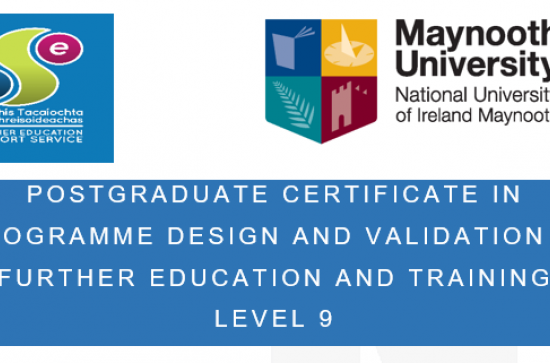
New Blended Learning Professional Development Course addresses Programme Design and Validation for Further Education and Training (FET)
Twenty professional educationalists will attend the first Level 9 one-year blended learning Post-graduate Certificate in Programme Design and Validation (PDV) for Further Education and Training (FET) workshop in the new School of Education building on February 8th. This workshop, 1 of 5 over a calendar year, is the first step for a qualification that responds to the national need for knowledge and skills in designing programmes at designated learning levels for validation by national awarding bodies such as QQI (Quality Qualifications Ireland) and others.
The publication of QQI Policies and Criteria for Programmes of Education and Training (revised 2017) has changed the quality assurance processes underpinning programme development for Irish FET providers. This means that in the coming years the FET sector will be obligated to have all programmes, approximately 5,000, re-validated in line with the QQI 2017 policies and criteria.
The participants secured places through application to the PAC (Post-graduate Applications Centre) and represent high level staff across many of the ETBs (Education and Training Boards), adult education NGOs (Non-Governmental Organisations) and others active in adult further and vocational educational development in Ireland. The proposed programme seeks to address the continuous professional development needs of FET programme implementation staff who are tasked with responsibility for re-design of existing, or development of new, programmes at NFQ (National Framework of Qualifications) levels 1-6.
The course was designed collaboratively by staff in the Department of Adult and Community Education at Maynooth University and staff of the SOLAS (www.solas.ie) funded Further Education Support Service (FESS). The course will be jointly delivered by staff from both organisations in a blended format: face-to-face for 5 day-long workshops and continuous engagement through a virtual learning environment (VLE), Moodle, and group interaction on Microsoft Teams.
The course steering committee is Josephine Finn and Michael Kenny from the Department of Adult and Community Education at Maynooth University, Finola Butler, Mary Sheehy, and Jenny Whelan of the Further Education Support Service. Denise Shannon, an associate staff member of the Department of Adult and Community Education is the course e-learning moderator.
